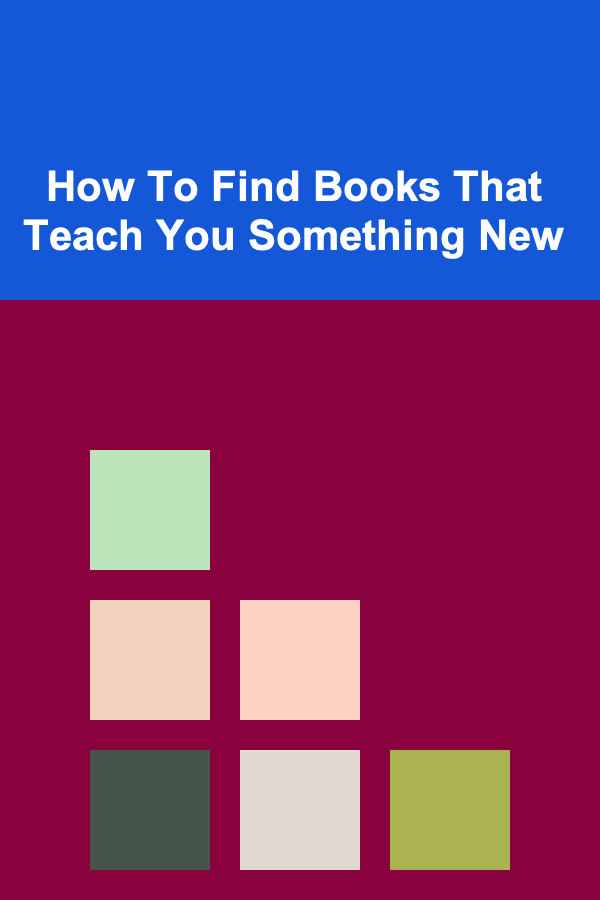
How To Find Books That Teach You Something New
ebook include PDF & Audio bundle (Micro Guide)
$12.99$7.99
Limited Time Offer! Order within the next:

Introduction: The Quest for Novel Knowledge
In a world saturated with information, the pursuit of truly novel knowledge can feel like an increasingly difficult task. We are bombarded daily with news cycles, social media updates, and readily accessible online content. Yet, the kind of deep, transformative learning that fundamentally alters our understanding of the world often requires a more focused and deliberate approach. Books, in their sustained and structured format, offer a unique pathway to acquiring new perspectives, skills, and insights. This essay explores a comprehensive strategy for identifying and selecting books that genuinely expand your horizons and equip you with knowledge you didn't possess before. It goes beyond simply finding popular titles and delves into techniques for uncovering hidden gems, assessing the quality of information, and actively engaging with the material to maximize learning.
I. Defining "Something New": Identifying Your Knowledge Gaps
Before embarking on your book-hunting adventure, it's crucial to define what "something new" means to you. This involves a process of self-reflection and a clear understanding of your current knowledge base. A lack of clarity here will lead to unfocused searches and ultimately, a higher likelihood of choosing books that reiterate existing beliefs rather than challenging them. Consider these questions:
- What are your intellectual curiosities? What topics have always intrigued you, even if you lack formal knowledge in them? This could be anything from astrophysics to ancient history, from behavioral economics to Bayesian statistics. The key is to identify areas where your inherent interest will fuel your learning.
- What skills do you want to develop? Are you looking to enhance your professional capabilities (e.g., project management, data analysis, public speaking) or personal pursuits (e.g., cooking, gardening, playing a musical instrument)? Identifying concrete skills will help you narrow your search to practical, how-to guides.
- What perspectives are you lacking? Are you primarily exposed to information from a limited set of sources or viewpoints? Actively seeking out books that challenge your assumptions and offer alternative narratives is vital for intellectual growth. This might involve exploring perspectives from different cultures, historical periods, or socio-economic backgrounds.
- What are the limitations of your current knowledge? Where do you feel uncertain or insecure in your understanding of the world? Identifying these gaps can guide you towards books that address specific weaknesses and build a more robust foundation of knowledge.
Once you've reflected on these questions, try creating a list of potential topics or skills you'd like to explore. Be as specific as possible. For example, instead of simply writing "history," consider "the social history of the Industrial Revolution in England" or "the history of Islamic art in the Iberian Peninsula." The more precise your initial focus, the more effective your search will be.
II. Exploring Diverse Avenues for Book Discovery
Finding the right book requires venturing beyond the obvious choices and exploring a range of discovery methods. Relying solely on bestseller lists or algorithm-driven recommendations often leads to a homogeneity of content, limiting your exposure to truly novel ideas. Here are several strategies to broaden your search:
A. Leveraging Online Resources
- Goodreads and Similar Platforms: These social reading platforms allow you to track your reading progress, rate books, and discover new titles based on your past preferences. However, don't rely solely on the algorithm. Actively browse the shelves of users with similar tastes, explore book lists curated by experts, and pay attention to reviews from diverse perspectives.
- Amazon and Other Online Retailers: While Amazon's recommendation engine can be useful, be sure to delve deeper than the "Customers Who Bought This Item Also Bought" section. Explore the "Look Inside" feature to preview the book's content and writing style. Read a significant number of reviews, paying attention to both positive and negative feedback. Look for reviews that address the book's accuracy, clarity, and originality.
- Academic Databases and Online Libraries: For more scholarly pursuits, consider exploring resources like JSTOR, Project MUSE, and university library websites. These platforms offer access to a wealth of peer-reviewed articles, academic journals, and scholarly books that are often overlooked by mainstream recommendation systems. However, accessing these resources may require a subscription or affiliation with an academic institution.
- Online Forums and Communities: Participate in online discussions related to your areas of interest. Engage with experts and enthusiasts, ask for book recommendations, and share your own reading experiences. Platforms like Reddit, Quora, and specialized online forums can be valuable sources of insider knowledge.
- Book Blogs and Review Websites: Numerous book blogs and review websites offer insightful commentary and recommendations across a wide range of genres. Look for blogs that align with your specific interests and that prioritize thoughtful analysis over superficial reviews. Examples include sites dedicated to specific academic disciplines or literary genres.
- Publisher Websites and Catalogs: Explore the websites of publishers specializing in the topics you're interested in. Many publishers offer detailed catalogs of their books, including descriptions, reviews, and author biographies. This can be a particularly effective way to discover new and emerging authors.
B. Exploring Offline Channels
- Libraries: Your local library is an invaluable resource for discovering new books. Browse the shelves, attend book talks and author events, and ask librarians for recommendations. Librarians are trained to assist patrons in finding relevant materials and can often suggest hidden gems that you wouldn't find on your own.
- Bookstores: Independent bookstores often curate their selections more thoughtfully than large chain stores. Talk to the booksellers, browse the shelves, and attend book readings. Independent bookstores are also more likely to carry books from smaller presses and independent authors.
- Used Bookstores and Antique Shops: These establishments can be treasure troves for discovering older and less-known titles. You might stumble upon a forgotten classic or a niche book that perfectly aligns with your interests.
- University Bookstores: University bookstores often carry a wider range of academic books and textbooks than general bookstores. Even if you're not a student, you can browse the shelves and discover books related to specific academic disciplines.
- Recommendations from Trusted Individuals: Ask friends, family members, colleagues, and mentors for book recommendations. Choose individuals whose opinions you value and who have a track record of recommending books that you enjoy. Explain your specific interests and ask for recommendations based on those interests.
C. Serendipitous Discovery
- Footnotes and Bibliographies: When reading a book you enjoy, pay attention to the footnotes and bibliographies. These sections often contain references to other books that might be of interest. Following the trail of citations can lead you to a wealth of new knowledge.
- Reviews and Articles: Read reviews of books you're interested in, but also pay attention to the reviews of books that you're not interested in. Sometimes, a review of a book on a seemingly unrelated topic can spark your interest and lead you to discover something new. Similarly, reading articles on topics that pique your curiosity can lead you to relevant book recommendations.
- Conferences and Workshops: Attending conferences and workshops related to your areas of interest can expose you to new ideas and introduce you to authors and experts in the field. Many conferences have book exhibits where you can browse the latest publications.
III. Evaluating the Quality and Relevance of Information
Finding a book is only the first step. It's crucial to critically evaluate the quality and relevance of the information presented. Not all books are created equal, and it's important to distinguish between well-researched, insightful works and those that are poorly written, biased, or inaccurate. Consider these factors:
A. Author Credentials and Expertise
- Author's Background: Research the author's background and credentials. Are they an expert in the field they're writing about? Do they have relevant experience or qualifications? Be wary of authors who lack the necessary expertise or who have a vested interest in promoting a particular viewpoint.
- Affiliations and Funding: Consider the author's affiliations and sources of funding. Are they affiliated with a particular organization or political group? Did they receive funding from a source that might influence their perspective? Transparency in these areas is crucial.
B. Publisher Reputation and Editorial Oversight
- Publisher's Reputation: Some publishers are known for their commitment to quality and accuracy, while others are more focused on commercial success. Research the publisher's reputation and track record. Are they known for publishing peer-reviewed works? Do they have a rigorous editorial process?
- Editorial Process: Inquire about the publisher's editorial process. Do they employ fact-checkers and copy editors? Do they have a system for verifying the accuracy of information? A robust editorial process is a sign of a reputable publisher.
C. Evidence and Support
- Sources and Citations: Look for books that are well-researched and that cite credible sources. Are the author's claims supported by evidence? Do they provide footnotes, endnotes, or a bibliography? A lack of sources or reliance on unreliable sources is a red flag.
- Objectivity and Bias: Assess the author's objectivity and potential biases. Do they present multiple perspectives on the issue? Do they acknowledge opposing viewpoints? Be wary of books that are overly polemical or that present a one-sided view of the topic.
- Logical Consistency: Evaluate the author's reasoning and logical consistency. Are their arguments sound? Do their conclusions follow logically from the evidence they present? Look for logical fallacies or inconsistencies in their reasoning.
D. Reviews and Critical Reception
- Professional Reviews: Read reviews of the book from reputable sources, such as academic journals, literary magazines, and newspapers. Pay attention to reviews that address the book's accuracy, originality, and contribution to the field.
- Reader Reviews: Read reader reviews on platforms like Goodreads and Amazon, but take them with a grain of salt. Reader reviews can be helpful for gauging the book's readability and overall appeal, but they may not always be accurate or unbiased.
- Awards and Recognition: Consider whether the book has received any awards or recognition from reputable organizations. Awards can be a sign of a book's quality and significance.
E. Assessing Relevance to Your Goals
- Content Alignment: Scrutinize the table of contents, index, and sample chapters to ensure the book covers the specific topics you're interested in. Don't assume the title accurately reflects the content.
- Depth of Coverage: Determine whether the book provides sufficient depth for your learning objectives. A superficial overview might not be enough if you're seeking a thorough understanding. Conversely, highly technical texts may be overwhelming for beginners.
- Practical Application: If your goal is to acquire a specific skill, assess the book's emphasis on practical exercises, examples, and real-world applications. Theoretical knowledge is valuable, but hands-on experience is often essential for mastering new skills.
IV. Active Reading and Knowledge Integration
Simply reading a book is not enough to truly learn something new. Active reading and knowledge integration are essential for maximizing the learning experience. This involves engaging with the material in a thoughtful and deliberate way, connecting new information to your existing knowledge, and applying what you've learned in practical settings.
A. Active Reading Techniques
- Highlighting and Underlining: Highlight or underline key passages and ideas. This helps you to focus your attention and to identify the most important information. However, don't over-highlight. Only highlight passages that are truly significant.
- Note-Taking: Take notes while you read. Summarize key points, ask questions, and make connections to your own experiences. Note-taking helps you to process the information and to retain it more effectively.
- Marginalia: Write comments and questions in the margins of the book. Engage in a dialogue with the author. Challenge their arguments, question their assumptions, and offer your own perspectives.
- Summarization: After reading each chapter or section, summarize the key points in your own words. This helps you to consolidate your understanding and to identify any gaps in your knowledge.
- Questioning: Ask yourself questions about the material you're reading. What are the key concepts? How do they relate to each other? What are the implications of these ideas? Questioning helps you to think critically about the material and to deepen your understanding.
B. Connecting New Information to Existing Knowledge
- Relating to Personal Experiences: Connect the information you're learning to your own personal experiences. How does this information relate to your life? How can you apply it in your own work or personal pursuits?
- Integrating with Previous Learning: Connect the information you're learning to your previous knowledge. How does this information relate to what you already know? Does it confirm or contradict your existing beliefs?
- Creating Mental Models: Create mental models to help you understand and remember the information. Mental models are simplified representations of complex systems or concepts. They can help you to organize your thoughts and to make connections between different ideas.
C. Applying What You've Learned
- Practical Application: Apply what you've learned in practical settings. If you're learning a new skill, practice it regularly. If you're learning about a new concept, try to explain it to someone else.
- Experimentation: Experiment with the ideas you're learning. Try different approaches, test your assumptions, and see what works best for you.
- Sharing Your Knowledge: Share your knowledge with others. Write a blog post, give a presentation, or teach a class. Sharing your knowledge helps you to consolidate your understanding and to reinforce your learning.
D. Dealing with Challenging Material
- Break it Down: If you're struggling to understand a particular concept, break it down into smaller, more manageable parts. Focus on mastering each component before moving on.
- Seek External Resources: Don't hesitate to consult external resources like online tutorials, academic papers, or even other books to supplement your understanding. Different authors may explain the same concept in ways that resonate better with you.
- Time Management: Allocate sufficient time for reading and processing challenging material. Rushing through difficult sections can lead to frustration and incomplete understanding.
- Embrace Discomfort: Recognize that learning often involves discomfort and the challenge of grappling with unfamiliar ideas. Don't be discouraged by initial difficulties. Persevere and celebrate your progress.
V. Beyond the Book: Continuous Learning and Exploration
Finding books that teach you something new is not a one-time event, but rather an ongoing process of continuous learning and exploration. The world is constantly changing, and new knowledge is constantly being generated. It's important to cultivate a lifelong habit of learning and to remain open to new ideas and perspectives.
- Stay Curious: Cultivate a sense of curiosity and a desire to learn new things. Ask questions, explore new topics, and never stop seeking knowledge.
- Embrace Lifelong Learning: Make learning a lifelong habit. Read regularly, attend lectures and workshops, and engage in intellectual discussions.
- Be Open to New Perspectives: Be open to new ideas and perspectives, even if they challenge your existing beliefs. Challenge your assumptions and be willing to change your mind.
- Connect with Other Learners: Connect with other learners and share your knowledge and experiences. Join a book club, attend a conference, or participate in online discussions.
- Reflect on Your Learning: Regularly reflect on what you've learned and how it has changed your understanding of the world. Keep a journal, write essays, or engage in other forms of self-reflection.
- Adapt and Evolve: Be willing to adapt your learning strategies as your needs and interests change. Explore new formats, such as audiobooks or online courses, and experiment with different learning techniques.
Conclusion: The Rewarding Journey of Discovery
The search for books that genuinely teach you something new is a rewarding journey that enriches your understanding of the world and empowers you to grow intellectually. By defining your knowledge gaps, exploring diverse avenues for book discovery, evaluating the quality and relevance of information, and actively engaging with the material, you can unlock a wealth of new knowledge and perspectives. Remember that learning is a lifelong process, and the pursuit of knowledge should be driven by curiosity, a willingness to challenge your assumptions, and a commitment to continuous growth. Embrace the challenge, celebrate your discoveries, and enjoy the transformative power of books.

How to Create a Checklist for Engaging Followers with Polls, Quizzes, and Surveys
Read More
How to Invest in Dividend Stocks for Consistent Income
Read More
How to Manage Inventory for a Small Business
Read More
How To Manage Kids' Arguments and Disagreements
Read More
How to Plan a Garden BBQ Party at Home
Read More
How to Use Lighting to Create a Relaxing Spa-Like Bathroom
Read MoreOther Products

How to Create a Checklist for Engaging Followers with Polls, Quizzes, and Surveys
Read More
How to Invest in Dividend Stocks for Consistent Income
Read More
How to Manage Inventory for a Small Business
Read More
How To Manage Kids' Arguments and Disagreements
Read More
How to Plan a Garden BBQ Party at Home
Read More